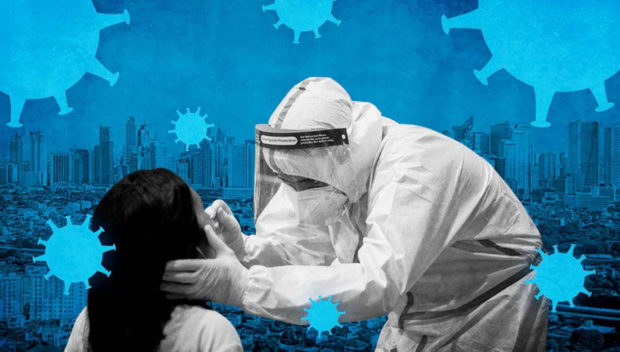MANILA, Philippines—With the efficacy of COVID-19 vaccines “waning,” the Department of Health (DOH) said even individuals already vaccinated against the virus are now having severe infections.
The US Centers for Disease Control and Prevention (US CDC) had stressed that the use of COVID vaccines gives 90 percent protection against symptomatic infection, severe illness and death.
However, while vaccines give a layer of protection against complications, its effectiveness wanes, which Octa Research’s Dr. Guido David said was one of the reasons for the COVID-19 wave last month.
Acting Health Secretary Maria Rosario Vergeire said 70 to 80 percent of severe COVID-19 cases before were those of the unvaccinated, but now, even the vaccinated are having severe infections.
RELATED STORY: Latest COVID wave: When waning immunity, expired vaccines, new strains mix
She said on Thursday (Sept. 1) that severe COVID-19 cases in hospitals now comprise 50 percent vaccinated and 50 percent unvaccinated. Currently, the Philippines has 22,259 active cases.
Vergeire stressed that while there should be strong evidence first, the present trend “gives us a warning that the immunity is waning since there are people already vaccinated but are still admitted in our hospitals because of severe infections.”
Vaccine effectiveness
Based on a study published in The Lancet, vaccine efficacy wanes five months after the second dose, revealing that at five months, the effectiveness of Pfizer-BioNTech, AstraZeneca, and Moderna vaccines were reduced to 82.1 percent, 75.7 percent, and 84.3 percent.
The study, “COVID-19 Vaccine Waning and Effectiveness and Side-Effects of Boosters,” stated that vaccine efficacy decreased more in people who are 55 years or older and in people with comorbidity.
“After five months, vaccine effectiveness remained high among individuals younger than 55 years. Booster doses restore vaccine effectiveness. Adverse reactions after booster doses were similar to those after the second dose,” it said.
“The effectiveness against infection of COVID-19 vaccines waned considerably five to eight months after primary vaccination, although it remained high, particularly among people younger than 55 years.”
Last July, the DOH warned that COVID-19 cases could be as high as 19,306 by the end of August if vaccination and booster rates, as well as compliance with minimum public health standards, do not improve.
READ: Low vaccination, booster turnout may lead to over 19,000 daily COVID cases by August — DOH
This, as the DOH had told CNN Philippines that since the “wall of immunity [against COVID-19] is really going down,” hospitalizations could possibly rise by August and September.
It said, however, that if vaccination and booster rates, as well as compliance with minimum public health standards, improve, case increase may be slower and more controlled at about 6,194 to 8,346 cases.
Vaccination problems
Last Wednesday (Aug. 31), the DOH conceded that it could no longer meet its vaccination target within the first 100 days of Ferdinand Marcos Jr. as president.
READ: DOH: ‘PinasLakas’ won’t meet target
This, as the booster campaign reached only nine percent of its target population for first boosters, with Vergeire saying that the “PinasLakas” campaign is “still very far” from its goal.
The campaign, which was launched last July, aimed to vaccinate 90 percent of the elderly population and administer first booster shots to 50 percent of the eligible population by Oct. 8.
Vergeire said that to achieve the 50 percent booster coverage, the department needs to vaccinate 23,840,032 individuals or 397,334 individuals every day for 60 days: “The DOH will make vaccines more accessible and available.”
READ: DOH aims for 23M booster shots in Bongbong Marcos’ first 100 days
But based on data from the DOH, only 24,661 senior citizens have been administered with the primary series while only 2.1 million individuals have received their first booster shots since the campaign was launched.
RELATED STORY: DOH yet to reach booster target in Bongbong Marcos’ first 100 days
As of Sept. 2, out of the 72,574, 454 individuals eligible for booster shots, only 18,086,979 have availed themselves of the additional layer of protection against the severe complications of COVID-19.
Persisting concerns
Vergeire said most of the elderly population the DOH had talked to had said that they were already old and that they no longer needed to get a booster against COVID-19, while some expressed concern that the vaccine would worsen their existing illnesses.
As indicated by the March 16-31 data from Johns Hopkins Center for Communications program, 60 percent of Filipino respondents who would “probably, probably not and definitely not” get vaccinated were “concerned about side effects.”
Vergeire, however, recognized that while there are people who do not want to get vaccinated, there are those who are willing but do not have access—the reason that the DOH is planning to have a weeklong vaccination drive again.
“We are planning for a special week of vaccination drives all over the Philippines this coming end of the month of September, we are arranging the details,” she said.
“That’s the step we’re considering to expand the vaccination coverage. If we don’t meet the target, hopefully we’ll reach half of it.”
